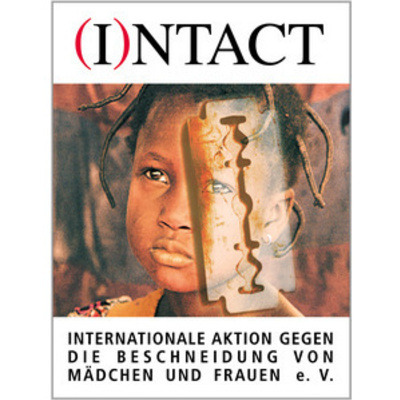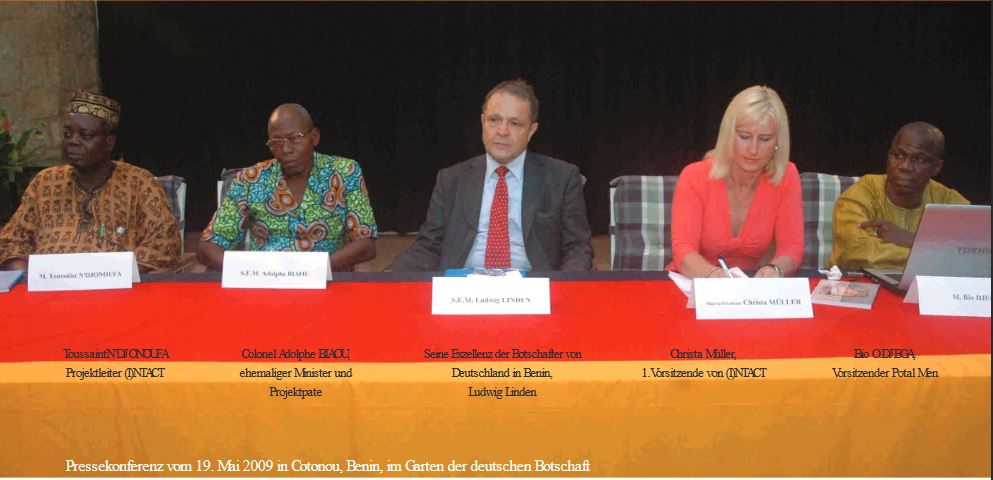Intact e.V.: FGM is Structural Violence

by Milena Rampoldi, ProMosaik. Edited by William Hanna. I
would like to thank Christa Müller —founder and chairperson of the association
(I)NTACT e.V. — for taking time to let me interview her. For ProMosaik the
struggle against FGM is a universal struggle for the well-being of all society.
Religion cannot be used to justify FGM because the concept of FGM in non-existent
in all religions. The example of (I)INTACT shows how FGM can really be ended.
would like to thank Christa Müller —founder and chairperson of the association
(I)NTACT e.V. — for taking time to let me interview her. For ProMosaik the
struggle against FGM is a universal struggle for the well-being of all society.
Religion cannot be used to justify FGM because the concept of FGM in non-existent
in all religions. The example of (I)INTACT shows how FGM can really be ended.
Milena
Rampoldi: Which is the main objective of Intact?
Christa Müller: The main
objective of (I)NTACT e.V. is to definitively abolish FGM in as many countries
as possible.
Rampoldi: Which is the main objective of Intact?
Christa Müller: The main
objective of (I)NTACT e.V. is to definitively abolish FGM in as many countries
as possible.
MR:
What does FGM mean and how severe are the consequences?
CM: FGM is practised in
different forms. In most of the cases, the operation is executed without
anaesthesia and under insufficient hygienic conditions. In the most frequent
cases, more or less big parts of the clitoris and the labia minora are
partially or completely removed (excision). In the so-called infibulation,
parts of the labia majora are cut as well, and the remaining parts are closed
with a suture or spines, just by leaving a rice corn-sized opening. The
consequences for the physical and psychological health are often severe. It is
estimated that some five percent of the girls die because of the operation.
What does FGM mean and how severe are the consequences?
CM: FGM is practised in
different forms. In most of the cases, the operation is executed without
anaesthesia and under insufficient hygienic conditions. In the most frequent
cases, more or less big parts of the clitoris and the labia minora are
partially or completely removed (excision). In the so-called infibulation,
parts of the labia majora are cut as well, and the remaining parts are closed
with a suture or spines, just by leaving a rice corn-sized opening. The
consequences for the physical and psychological health are often severe. It is
estimated that some five percent of the girls die because of the operation.
MR: ProMosaik considers FGM as a torture
inflicted to women by women because it is part of so-called tradition. FGM, However, is not
recognised by any of the monotheistic religions. What is your opinion on that?
CM: FGM means structural
violence. It would be insufficient to define this tradition as a torture
inflicted on women by women. The mothers and grandmothers who have their
daughters and granddaughters circumcised do it to meet the requirements of
their society. They just want the best for their girls. In addition, the best
for them in these societies is still the marriage. Unmarried women have no
chance of taking care of themselves. If the marriage is only possible for
circumcised girls, then FGM becomes essential for girls. If something has to
change, men must start to marry un-circumcised women, and the husbands’ families must accept
daughters and sisters in-law without circumcision. The whole society must be
involved in fighting FGM. In addition, women must have the right to live their
life without marriage.
None of the monotheistic religions require female circumcision.
The tradition was established before the origin monotheistic religions. During
archaeological excavations, mummies of circumcised women were found. However,
religion does play an important role. The majority of the people practising
these traditions are Muslims. The tradition is also performed by Christians and
followers of natural religions. In general, in Islam there is the commandment
of physical integrity of all people. However, many believers consider FGM as
religious act representing the ritual purity of women. The chastity required
from girls and women should be achieved by reducing the female libido.
Therefore, the matter is always about how to control female sexuality with
extremely drastic methods. It would be very helpful if the religious authority
of Islam explicitly condemned FGM everywhere including the smallest of villages.
inflicted to women by women because it is part of so-called tradition. FGM, However, is not
recognised by any of the monotheistic religions. What is your opinion on that?
CM: FGM means structural
violence. It would be insufficient to define this tradition as a torture
inflicted on women by women. The mothers and grandmothers who have their
daughters and granddaughters circumcised do it to meet the requirements of
their society. They just want the best for their girls. In addition, the best
for them in these societies is still the marriage. Unmarried women have no
chance of taking care of themselves. If the marriage is only possible for
circumcised girls, then FGM becomes essential for girls. If something has to
change, men must start to marry un-circumcised women, and the husbands’ families must accept
daughters and sisters in-law without circumcision. The whole society must be
involved in fighting FGM. In addition, women must have the right to live their
life without marriage.
None of the monotheistic religions require female circumcision.
The tradition was established before the origin monotheistic religions. During
archaeological excavations, mummies of circumcised women were found. However,
religion does play an important role. The majority of the people practising
these traditions are Muslims. The tradition is also performed by Christians and
followers of natural religions. In general, in Islam there is the commandment
of physical integrity of all people. However, many believers consider FGM as
religious act representing the ritual purity of women. The chastity required
from girls and women should be achieved by reducing the female libido.
Therefore, the matter is always about how to control female sexuality with
extremely drastic methods. It would be very helpful if the religious authority
of Islam explicitly condemned FGM everywhere including the smallest of villages.
MR: In which countries do you work? Which are
the most successful strategies?
CM: (I)NTACT works in
the Western African countries Benin, Togo, Burkina Faso, Ghana, Senegal,
Gambia.
(I)NTACT always works with a partner organisation on the spot
because they fully familiar with the circumstances in their own countries. As a
small association, (I)NTACT always adapts its strategies to the relevant
requirements. Such flexibility is a great advantage. First, all people are
informed nationwide from village to village and from farm to farm about the
severe health problems caused by FGM.
In traditional societies men who have an extended authority as
protectors of the tradition and religious leaders play a particularly important
role. They have to recognise that the elimination of the tradition has no
spiritual disadvantages. Therefore, they have to be totally involved in the
awareness-raising process. Because the “circumcisers” lose their income if they
cannot practice their profession, we can offer our support with compensation.
The former circumcisers get retraining and small mortgages. It is also important
to strengthen the position of women by giving them access to education and
information about their rights so that sustainability can be guaranteed.
Consequently, (I)NTACT
remains on the spot with different small projects so as to monitor the situation
after FGM has been ended. It is important to avoid “FGM tourism” from a freed region
into regions where FGM is still practiced. Therefore, we have to work
nationwide and cross-border.
the most successful strategies?
CM: (I)NTACT works in
the Western African countries Benin, Togo, Burkina Faso, Ghana, Senegal,
Gambia.
(I)NTACT always works with a partner organisation on the spot
because they fully familiar with the circumstances in their own countries. As a
small association, (I)NTACT always adapts its strategies to the relevant
requirements. Such flexibility is a great advantage. First, all people are
informed nationwide from village to village and from farm to farm about the
severe health problems caused by FGM.
In traditional societies men who have an extended authority as
protectors of the tradition and religious leaders play a particularly important
role. They have to recognise that the elimination of the tradition has no
spiritual disadvantages. Therefore, they have to be totally involved in the
awareness-raising process. Because the “circumcisers” lose their income if they
cannot practice their profession, we can offer our support with compensation.
The former circumcisers get retraining and small mortgages. It is also important
to strengthen the position of women by giving them access to education and
information about their rights so that sustainability can be guaranteed.
Consequently, (I)NTACT
remains on the spot with different small projects so as to monitor the situation
after FGM has been ended. It is important to avoid “FGM tourism” from a freed region
into regions where FGM is still practiced. Therefore, we have to work
nationwide and cross-border.
MR: What have you
achieved until now and what are your hopes for the future?
CM: The two neighbour
countries Benin and Togo have been freed already. There FGM is just practised
in very rare and exceptional cases. Ghana will be the next country in which
girls will not be victims of FGM anymore. In various regions of Burkina Faso
and in parts of Senegal (I)NTACT was also able to efficiently struggle against
FGM. For the future, I wish that Burkina Faso would be FGM-free within 2025 at
the latest.

MR:
How important is awareness-raising of the problem in Europe, and why?
CM: Europe must
guarantee compliance with human rights. Moreover, the right to physical
integrity for all people, all girls and guys living in Europe, are part of it.
If we are able to change the immigrants’ mentality, this can also positively influence people in the
countries of origin of European immigrants.
How important is awareness-raising of the problem in Europe, and why?
CM: Europe must
guarantee compliance with human rights. Moreover, the right to physical
integrity for all people, all girls and guys living in Europe, are part of it.
If we are able to change the immigrants’ mentality, this can also positively influence people in the
countries of origin of European immigrants.


